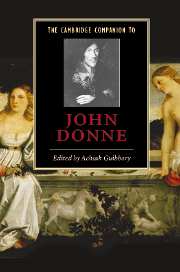Book contents
- Frontmatter
- 1 Donne’s life: a sketch
- 2 The text of Donne’s writings
- 3 The social context and nature of Donne’s writing: occasional verse and letters
- 4 Literary contexts: predecessors and contemporaries
- 5 Donne’s religious world
- 6 Donne’s political world
- 7 Reading and rereading Donne’s poetry
- 8 Satirical writing: Donne in shadows
- 9 Erotic poetry
- 10 Devotional writing
- 11 Donne as preacher
- 12 Donne’s language: the conditions of communication
- 13 Gender matters: the women in Donne’s poems
- 14 Facing death
- 15 Donne’s afterlife
- 16 Feeling thought: Donne and the embodied mind
- Select bibliography
- Index
- Series List
15 - Donne’s afterlife
Published online by Cambridge University Press: 28 November 2006
- Frontmatter
- 1 Donne’s life: a sketch
- 2 The text of Donne’s writings
- 3 The social context and nature of Donne’s writing: occasional verse and letters
- 4 Literary contexts: predecessors and contemporaries
- 5 Donne’s religious world
- 6 Donne’s political world
- 7 Reading and rereading Donne’s poetry
- 8 Satirical writing: Donne in shadows
- 9 Erotic poetry
- 10 Devotional writing
- 11 Donne as preacher
- 12 Donne’s language: the conditions of communication
- 13 Gender matters: the women in Donne’s poems
- 14 Facing death
- 15 Donne’s afterlife
- 16 Feeling thought: Donne and the embodied mind
- Select bibliography
- Index
- Series List
Summary
''One short sleepe past, wee wake eternally'': this line from the sonnet, ''Death be not proud,'' has been inscribed on the tombstone of various devotees of John Donne, none of them so fictional as the Victorian poet Randolph Henry Ash, the creation of A. S. Byatt in Possession (1990). In Byatt's romance, Ash's widow, Ellen, incorporates the line into a longer inscription that utters her wish for husband and wife to be joined together at the resurrection, ''where there will be no more parting.'' Her choice of the quotation pays silent tribute to something revealed in her journal, that in the last days of Ash's life they had been reading Donne's poems together, in particular ''The Relique.'' Ellen's fin de siècle fantasy seems just Victorian enough to prompt a pedant to observe that we have no record of any nineteenth-century readers invoking Donne's poetry in this way. Yet, when we consider that in forty-five years of cohabitation Randolph and Ellen never consummated their marriage, the fantasy is just outrageous enough to have interested Donne as a species of the ''mis-devotion'' (13) that might attend his writings after he died. Donne's explicit inscription in ''The Relique'' and other works of an interest in what future audiences might make of his writing suggests a deep longing ultimately to be known and understood.
- Type
- Chapter
- Information
- The Cambridge Companion to John Donne , pp. 233 - 246Publisher: Cambridge University PressPrint publication year: 2006
- 2
- Cited by



